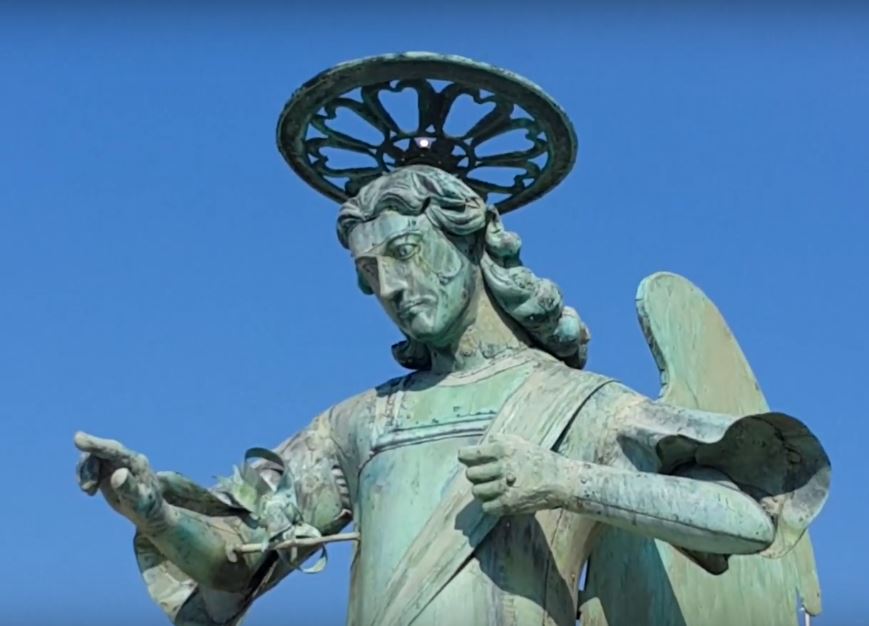News
STA, 2 April 219 - Aksinja Kermauner formally handed her resignation as the president of the Slovenian Writers' Association (Društvo slovenskih pisateljev – DSP) on Tuesday in protest at the state's attitude to the association and severe underfunding.
"The state has in fact brought an esteemed organisation such as the DSP to its knees," Kermauner said, adding that the association did not have enough funds to pay the staff and to function normally.
She said that the association should have found a crisis manager last summer as the current crisis begin to show, but the membership thought they would be up to the situation.
After four DSP assistants offered their resignation on Monday because the association was unable to pay them for their work, she said the DSP realised the dire situation it had found itself in.
"The state should realise this is an association of writers rather than of economists. The state should take care of our basic survival," Kermauner told the STA.
She said that members of the DSP bodies had been performing their duties as an honour and did not pay themselves out attendance fee because of the financial situation.
Data presented on the Odmevi news show on TV Slovenija last night indicates that the DSP received about EUR 230,000 a year on average from the Book Agency between 2014 and 2017, and EUR 212,800 last year.
The association has an annual budget of about half a million euro, 60% of which it gets from the state, while it has to secure the rest itself through donations, membership fees, rent and other sources.
However, Kermauner said that the figures did not say what the association had done with the funds, listing events such as the Vilenica International Literary Festival, Slovenian Book Days, and projects like the Trubar Fund, which supports publication of literary translations, and the journal Litterae Slovenicae.
Kermauner said that the association would need at least twice as much funding as it gets to be able to finance all of its projects and cover its own costs.
"The state has a stepmotherly attitude to what is a 150-year-old association," she said, noting that its premises were the hub of Slovenia's independence movement and made the history of the Slovenian nation.
She said that the association had lost its significance also because of underfunding: "We create a better world with a pen too. Culture leads the nation ahead, without culture the nation dies."
Asked about poor inter-personal relationships at the association, she said: "When there's a lot of money, the relationships are great, when it gets tough, everyone will look at where's something ... Where the crisis strikes, the relationships get strained. But this wasn't why I resigned."
Kermauner will serve as outgoing president until the DSP assembly elects her successor; the vote is planned for the second half of May.
Kermauner, a youth fiction author, poet and pedagogue, was appointed to head the DSP in September 2018, succeeding Ivo Svetina, who had resigned in June citing personal reasons.
STA, 2 April 2019 - The European Commission has confirmed that traffic fines notifying Slovenians that they have breached traffic regulations in another EU country should be issued in Slovenian. A number of Slovenians received notices from Austria and Italy which were not written in their native language.
Addressing a formal notification from a Slovenian MEP Patricija Šulin (EPP/SDS), who informed the Commission of this violation of the EU regulations along with other Slovenian MEPs, the Commission stressed that using the official language of a person who committed a traffic offence was a requirement on the local, regional, and the EU's level.
This regulation was adopted in 2015 by the European directive facilitating cross-border exchange of information on road-safety related traffic offences.
Šulin said that the Commission did not explicitly state how it was overseeing the implementation of the regulation in Austria and Italy. The countries' respective legislation systems ensure notifying Slovenians on traffic offences in Slovenian in theory.
The Commission stressed that it would take appropriate measures if it turned out that the two countries have been breaching their obligations under the directive, sending traffic tickets which were not in Slovenian to Slovenian citizens.
It also urged people to file an official complaint if they received notices that were not in their native language.
Bookmark this link and find the headlines faster each morning
This summary is provided by the STA
TEŠ gets green light for importing coal
LJUBLJANA - The Šoštanj coal-fired power plant (TEŠ) has been given the green light to import coal after the Environment Agency decided it did not need an environmental permit to mix the locally extracted lignite with imported coal. TEŠ said imports were only an alternative option and that it was not looking for a supplier. The former environment minister, Jure Leben, said in February that before issuing a permit for TEŠ to import coal, it should be determined whether those in charge of the controversial unit six, TEŠ6, had misled the public about the quality and quantity of coal reserves at the Velenje mine.
Slovenia opposes plan on 10,000-strong border force by 2027
BRUSSELS, Belgium - Slovenia does not support the compromise agreement to set up a 10,000-strong EU-wide border and coastguard by 2027. According to Slovenian diplomatic sources, the agreement does not bring sufficient added value and lacks objective criteria on determining national contributions. Unofficially, Slovenia joined Spain and Italy in opposition to the plan on Monday as EU members' ambassadors endorsed last week's agreement by the negotiators of the EU central institutions to reinforce the European Border and Coast Guard Agency.
Ex-Istrabenz CEO Bavčar gets 30 months for abuse of office
KOPER - The Koper District Court sentenced former Istrabenz general manager Igor Bavčar to two years and six months in prison for abuse of office. Since he is already serving a five-year prison sentence for money laundering related to a deal involving Istrabenz shares, he was given a uniform sentence of seven years and five months. The other defendant, former Maksima Holding director general Miroslav Golubić, got a year and eight months for complicity. Bavčar, a former home affairs minister, had acted to the detriment of Istrabenz to protect a company in which he was the absolute owner.
Teodor Žepič named acting DG of UKC Ljubljana
LJUBLJANA - The council of Slovenia's largest medical centre, UKC Ljubljana, appointed Teodor Žepič as acting director general, to succeed Aleš Šabeder, who became health minister last week. Žepič, 49, has been managing the Paediatric Clinic, a member of UKC Ljubljana, since June 2018, having previously served at managerial positions mainly in the banking sector. Žepič said his priority would be the hospital's restructuring. A full-term director is to be appointed by early July at the latest.
CoE report says Slovenian prisons overcrowded
STRASBOURG, France - Slovenian prisons are slightly overcrowded, shows a report on the state of European prison systems released by the Council of Europe. Slovenia had 100.5 inmates per 100 places available on average in 2018, while the European average was 91.4. The country's incarceration rate, at 61.1/100,000, remains one of the lowest in Europe. Slovenia saw the proportion of foreign prisoners increase to 14% of the prison population last year, which was due to illegal migration. Slovenia was also listed among countries which notably increased the prison budget in 2018.
Writers' chairman blames underfunding for resignation
LJUBLJANA - Aksinja Kermauner formally handed her resignation as the chairman of the Slovenian Writers' Association (DSP) in protest at the state's attitude to the association and severe underfunding. "The state has in fact brought an esteemed organisation such as the DSP to its knees," Kermauner said, adding that the association did not have enough funds to pay the staff and to function normally. She said the DSP would need at least twice as much funding as it received now. It received EUR 212,800 last year.
Int'l PEN meeting to look at "other" and reflect on young readers
BLED - The International Women's Committee, led by Australian PEN's Zoe Rodriguez, met in Bled ahead of the 51st International PEN writers' meeting opening on Wednesday. The central topics of this year's PEN meeting are the representation of the other and awakening interest in literature among young people. Fifty guests from 35 countries are expected until 7 April at what is the largest and longest-running writers' meeting in the world.
Resalta gets EUR 6m injection from EIF
LUXEMBOURG, Luxembourg - The Slovenian provider of energy and sustainable solutions Resalta signed an agreement with the European Investment Fund (EIF) under under which it will get an EUR 6m capital injection. The equity, half of which will be provided by private investors, will help the company make a transition from a start-up to a major international energy provider. The investment will be guaranteed by the European Fund for Strategic Investments), the key part of the Juncker Plan.
Adria Airways not to fly Sukhoi planes
BRNIK - The German-owned Slovenian air carrier Adria Airways announced it would not expand its fleet with Sukhoi Superjet SSJ100 aircraft, after failing to agree the terms of the long-term lease with the Sukhoi Civil Aircraft Company. The two companies signed a letter of intent under which Adria would lease 15 aircraft from the Russian company on 26 November. As a result, Adria would not need a capital injection to finance the arrival of new planes, but a EUR 10m recapitalisation was still planned.
Yugoslav-era phone spying hub opposite Postojna caves opened to public
POSTOJNA - Visitors of the famous Postojnska Jama caves will be able to access yet another well hidden secret, but this time of a very different kind. A museum of eavesdropping opened at Jama Hotel right next to the caves after a "non-existing" phone surveillance nest of the Communist secret police was discovered during renovation. The complex numbers several rooms and can also be accessed from the caves. They were discovered only in 2017, as they were reportedly not drawn in the hotel's original plans.
Visiting Ljubljana? Check out what's on this week
Part of the appeal of Slovenia as a destination is the remarkable variety of landscapes, climates, cuisines and cultural heritage packed into a relatively small area, due to the young nation’s position at the crossroads of north, south, east and west Europe. Piran, and the Slovenian coastal region of Istria in general, is a fine example of this, giving the country and access to the Adriatic as well as an area famed for its wines, olives, persimmons, seafood, architecture and – on occasion – wind (known as the burja or bora). For both short-term visitors and life-long residents of Slovenia it represents an escape from the inland and the chance to enter another, more Venetian world, an opportunity that should be seized whenever possible.
We thus present a short guide to spending from four to 48 hours in Piran, with a choice of sights and activities that isn’t meant to be exhaustive, or exhausting, but rather a simple presentation of things to see and do that’ll let you say: “Yes, I’ve been to Piran, and I loved it”.
Essential Sightseeing in Piran: The Old Town and the Sea
The town is an old Venetian settlement, ruled by the lagoon-based city state from 1283 to 1797, and this history can still be seen in many of the more notable buildings. The town’s proximity to Italy also means that Piran, or Pirano, is essentially bilingual, as seen in the two languages on the signs and often heard in the accented dialect of locals. The best place to see Venetian architecture is in the Old Town, basically the whole of touristic Piran, which can easily be explored on foot in a few of hours – it’s mostly pedestrianised – with breaks for cafés, light shopping and food.
Notable buildings include the Benecanka Casa Veneziana Pirano, aka the Venetian House, now a boutique hotel, but one that you can still enjoy from the outside. It’s long been a tourist attraction, as seen in the postcard below, and is said to have been built by a Venetian merchant for a local women he fell in love with.
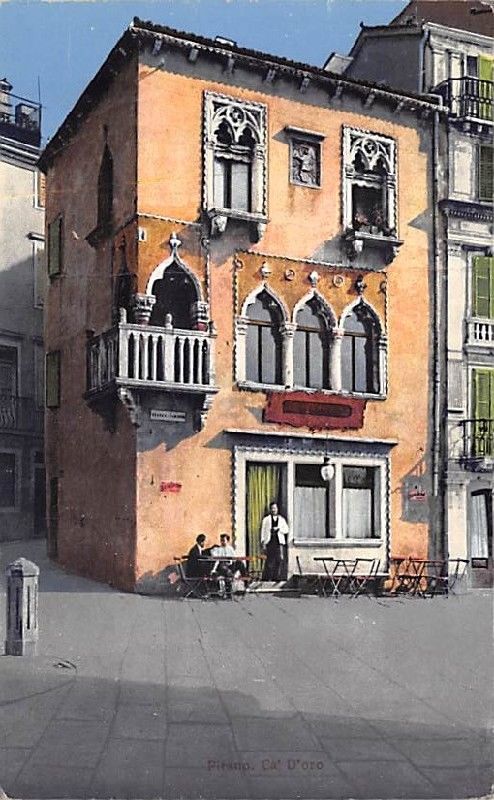
Postcard of the Venetian House, 1914. Source: Wikipedia
Venetian House can be found on the edge of Tartini Square, named after the composer Giuseppe Tartini (1692-1770), the first recorded owner of a Stradivarius. As old as it may look, this square is relatively recent. It was an open dock until 1894, when – the locals having grown sick of the smell of the sewage and waste that floated in the waters – it was filled in, with the statue of Tartini being placed there two years later.
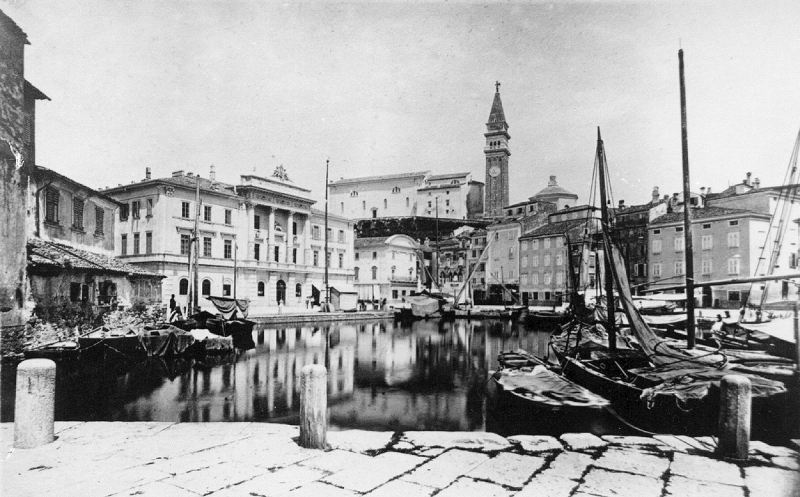
Photo of the dock that became Tartini Square, taken in the late 19th century, with Venetian House roughly in the middle. Source: Wikipedia
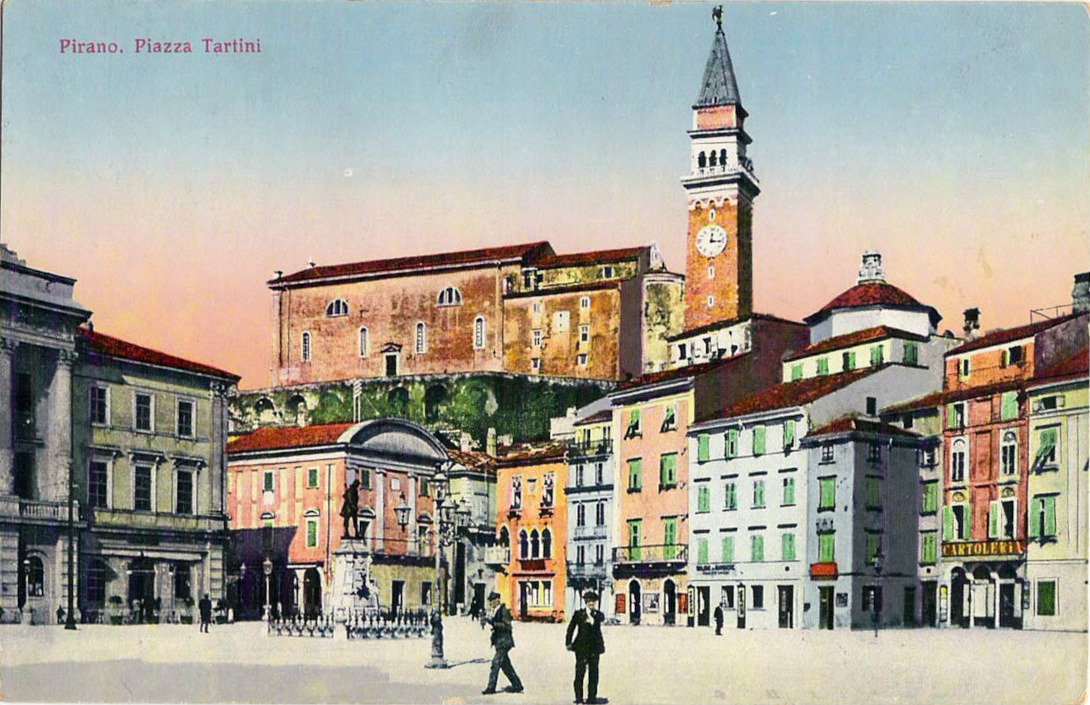
Postcard of Tartini Square in 1915. You can see the Venetian House behind the two men. Source: Wikipedia
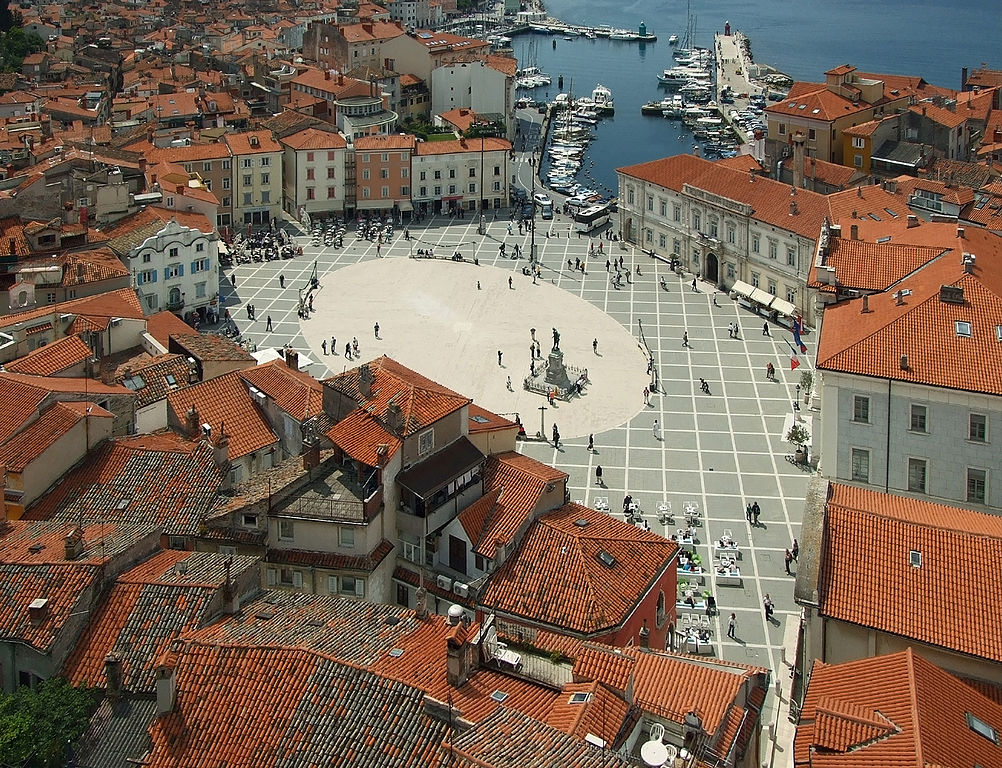
Tartini Square in 200. Source: Wikimedia - © Plamen Agov • studiolemontree.com CC by 3.0. You can see more old photos of the square here.
It’s from this square that you can see another icon of Piran, the statue of the Archangel Michael, which for a little over 250 years has been sitting atop the church of St George, moving to show the direction of the wind to the town’s seafaring residents. (It was taken down for a short time 2018, for some much needed repairs)
St Michael. Screenshot from YouTube
Another structure to seek out are the Cloisters of Saint Francis Monastery, a place that still houses Franciscan monks and one that’s known for having great acoustics. For that reason it hosts the Piran Music Evenings and Tartini Festival, with the latter taking place late summer (this year, 2019, from August 22 to September 9), with the official website here.
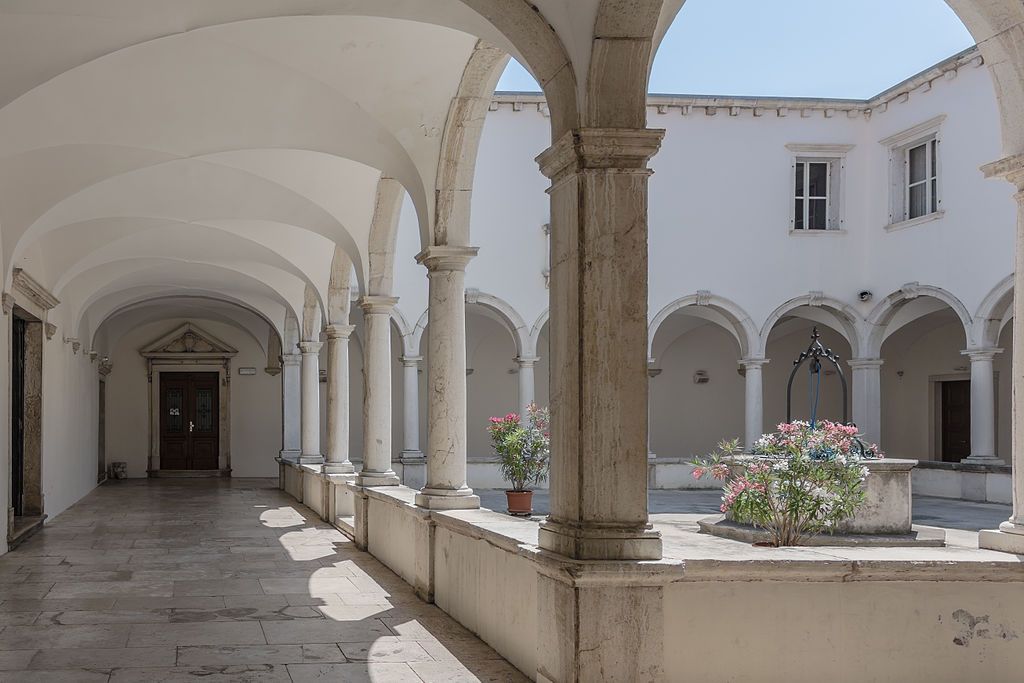
The Cloisters. Wikimedia - Isiwal CC-by-4.0
Before or after your walk around town you might want to sunbathe or swim, and you can do so at various spots, with some of what to expect (no sand) shown in the following video from Korea.
Things to do with 24 to 48 hours in Piran
Once you’ve seen the Old Town and bathed in the sun and/or the sea, you might want to take in some more of the related cultural and touristic offerings. These include the Sergej Mašera Maritime Museum, Piran Aquarium and the Museum of Underwater Activities(website down, at the time of writing), all of which offer what the names suggest. You can also find details of upcoming festivals, concerts and other events in Piran here.
If you’re spending longer in Piran then you might want to see a little more of the coast, that 47-km of Slovenia that separates Croatia from Italy. Within walking distance, or an easy cycle, drive, taxi or bus ride, is Portorož, a Riviera-style resort town with a very different feel to the Venetian peninsula. It’s here you’ll find casinos and beaches with recliners and umbrellas, with everything from top hotels and classy restaurants and a marina to pile ‘em high, sell ‘em cheap stores selling flip-flops, sunhats, sunglasses, inflatable items and so on. It’s not for everyone, but then neither is climbing Mount Triglav, so if it sounds interesting to you then take a look.
If you want to see more of the Venetian side of the coast then head on to Izola, although only if you haven’t been to Piran first. Meanwhile, the economic centre of the Slovenian Istria (aka Primorska) is the port town of Koper. While a little more developed than its neighbours, it still has another charming Venetian Old Town to explore.
Two areas that are more untouched, and where you’ll probably want to take your own food and drink, are Strunjan and Debeli rtič. Strunjan is a coastal nature reserve with many paths and trails for walking, hiking and biking, and the ideal place to get away from the crowds and ice sellers for a few hours. You can read our more detailed guide to this hidden treasure on coast here. A similar kind of experience can be had at Debeli rtič.
Tourist shopping in Piran
Piran is known for its salt pans, once the source of its wealth, and these are still in business, producing the famed local fleur de sel. Even if you don’t make the trip to see the seawater evaporating leaving these precious crystals, you’ll find stores all over town selling the stuff, both as a cooking ingredient and in various other preparation. Not made in Piran itself, but still in Slovenian Istria (aka Primorska or the Littoral), you might want to look out for local wines and produce. Wines offer include the red Refosco and white Malvazija, although there are also many other varieties and blends to enjoy, as outlined in this earlier article, while olives and PDO designated olive oil are produced nearby and are worth picking up or seeking out in restaurants.
Food and drink in Piran
As noted above, the region produces plenty of very drinkable wines, and often at prices lower than they’d command if they came with an Italian name, so do explore these if a fan of the grape. With regard to food, since you’re by the coast you should take the chance to check out the seafood restaurants. You’re also next to Italy, so don’t feel like you’re betraying Slovenia if you order some pasta and gelato.
If you’d like to learn more about Piran, including the stories that don’t make it into the tourist guides, then you can find all our articles on the town here
STA, 2 April 2019 - The coal-fired power plant in Šoštanj (TEŠ) has been given the green light to import coal, the public broadcaster TV Slovenija reported on Monday evening. The Environment Agency (ARSO) decided that TEŠ requires no new environmental permit for mixing the lignite from Velenje with imported coal.
According to the document obtained by TV Slovenija, TEŠ plans to have 1,200 tonnes of coal transported to Šoštanj by train every day.
The coal is to be mixed with the lignite from the near-by Velenje mine, so locals are concerned that the greenhouse gas emissions will increase as a result.
But ARSO says the change will have no impact on the health of the local population, which is why no new environmental permit is required, TV Slovenija reported.
According to Environment Minister Simon Zajc, the fact that the viable coal reserves at the Velenje mine are running out is an additional reason why TEŠ should be shut down before its lifespan expires.
Valter Kolar of the Šoštanj Civil Initiative said ARSO had not asked the local community for their opinion at all.
The power utility HSE, which owns TEŠ as well as the country's sole coal mine in Velenje, said that TEŠ would continue to be powered by lignite from Velenje while importing coal is only an alternative option for the time being.
TEŠ confirmed this for the STA today, saying it was not looking for a coal supplier and that importing coal was neither in its annual nor mid-term plans.
According to HSE, importing coal would be costlier than the lignite from Velenje and would raise TEŠ's annual costs by some EUR 20m a year.
TEŠ said it had only requested for a permit for importing coal at the end of last year to reduce the risks to the stable functioning of the power plant in the future.
In line with its valid environmental permit from 2010, the power plant is allowed to produce electricity by burning exclusively lignite from the Velenje mine.
Any plans for a change in operations must be reported to ARSO. If the change is minor, a new environmental permit is not necessary but if major changes are planned, a new permit is required.
The former environment minister, Jure Leben, said in early February that before issuing a permit for TEŠ to import coal, it should be determined whether those in charge of building the controversial unit six, TEŠ6, had misled the public about the quality and quantity of coal reserves at the Velenje mine.
The Velenje municipality said today that TEŠ should burn exclusively coal from the area, which was what had been asserted when TEŠ6 was being built.
The municipality is shocked by ARSO's decision allowing the imports of coal without any additional permits.
Units five and six were never not meant to be in operation at the same time, but now unit 5 is also running despite lower efficiency and bigger coal consumption, which has a negative impact on the environment, the municipality said.
If the coal from the Velenje mine was used more prudently, there would be no problems now, it added.
STA, 2 April 2019 - The Koper District Court sentenced on Tuesday former Istrabenz general manager Igor Bavčar to two years and six months in prison for abuse of office. Since he is already serving a five-year prison sentence for money laundering related to a deal involving Istrabenz shares, he was handed a uniform sentence of seven years and five months.
The other defendant, former Maksima Holding director general Miroslav Golubić, got a prison sentence of a year and eight months.
The prosecution demanded two years and a half for Bavčar and two years for Golubić.
The pair were on trial over a 2007 deal involving a purchase of Intereuropa shares.
The Istrabenz conglomerate entered a forward contract Maksima Holding had with the bank Banka Celje which set down a mandatory purchase of Intereuropa shares at a set price and in a specified period.
It bought almost 288,000 Intereuropa shares at 49 euro a piece from Banka Celje on 20 December 2007 at a price of EUIR 14.1m, and sold them back to the bank a day later at 36 euro a piece, or for around EUR 10.4m.
The prosecution has argued that by overpaying the shares by EUR 3.7m, Istrabenz incurred the damage that would have been otherwise incurred by Maksima Holding.
The court ordered today that all assets illegally gained by Maksima Holding be confiscated.
The ruling is not final yet.
The head of the judicial panel, Orjana Trunkl, said the deal was unnecessary, even harmful for Istrabenz. Bavčar clearly ventured into it to prevent damage to Maksima Holding, she said.
This was in his best interest as the absolute owner of the company FBI, which held a controlling stake in Maksima Holding, which was preparing the ground for the takeover of Istrabenz.
Golubić, whom the court found to be actively helping Bavčar, received a milder sentence because he was an accomplice and had no previous criminal record.
Neither of the defendants were in court today, but given their line of defence, they will probably lodge an appeal.
The prosecution in contrast, is happy with the ruling and will not appeal unless any procedural problems arise.
The team behind Open Kitchen (Odprta kuhna), who this year are bringing their open air food and drink markets to at least six locations around Slovenia (Ljubljana, Celje, Koper, Nova Gorica, Ptuj & Novo Mesto, as reported here), also run another, more focused event – the Pivo & Burger Fest in Ljubljana. These see the usual venue, Pogačarjev trg (the marketplace between the Cathedral and Plečnik’s Arcades) full of stalls selling craft beer, burgers, BBQ and other delights, the air full of the smells and sounds of grilled meat, along with music, conversation and laughter.
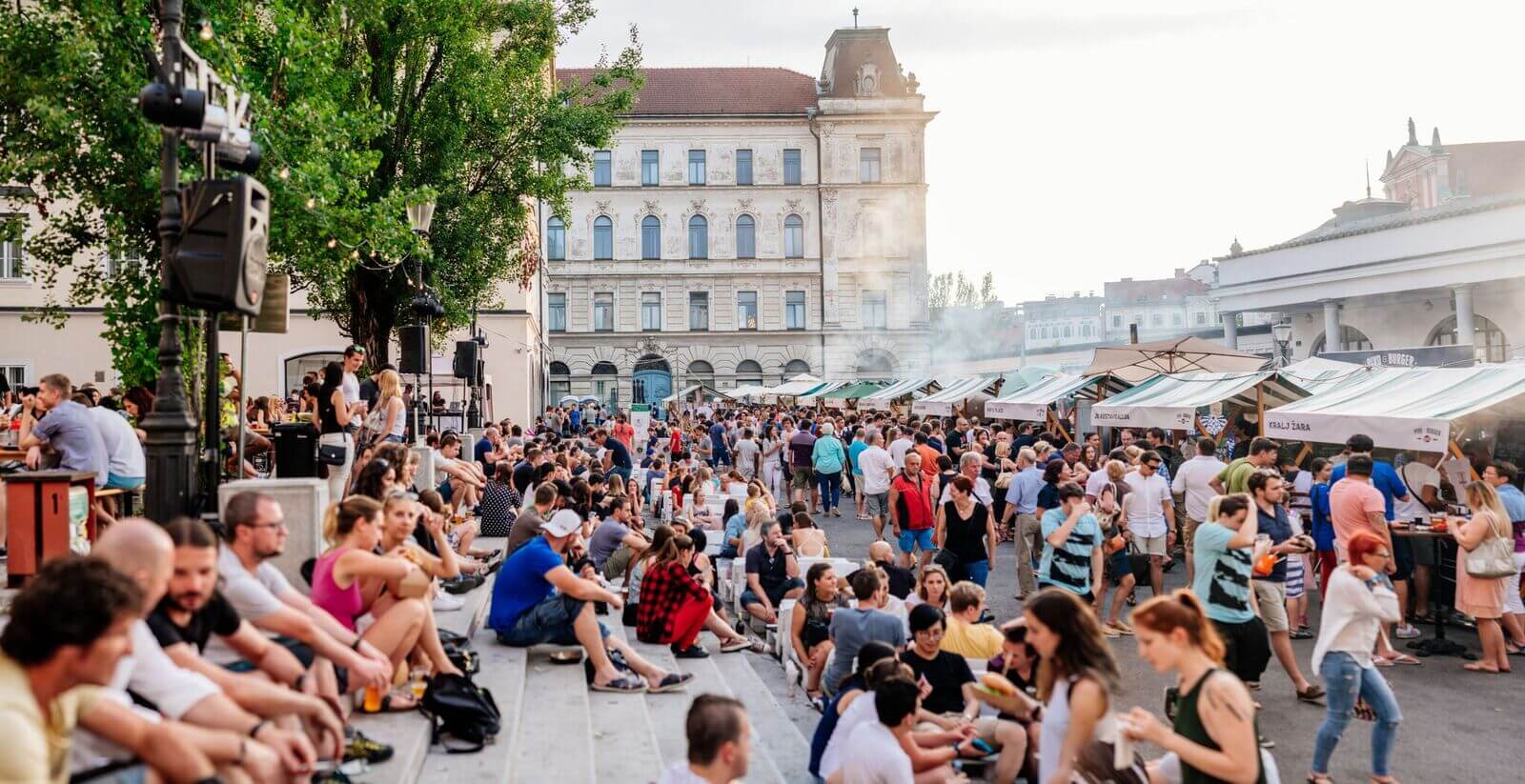


It’s a fine chance to catch up and sample what’s been happening in the world of Slovenian brewing and – if you haven’t been paying attention – then you could be in for some surprises. A few years ago the scene was still focused on IPAs, often of the ever hoppier variety, but now with well over 100 brewers in the country, from one room operations like Omnivar to (semi-Austrian) giants like Bevog, there’s been an explosion in variety. So alongside IPAs and lagers of all kinds you’ll find, among the more than 200 brews on offer at the festival, wheats, porters, ales, pales, reds, and many other types, including my current obsession – gose, or sour beer, a refreshing, fruity drink that’ll change the way you think about beer.
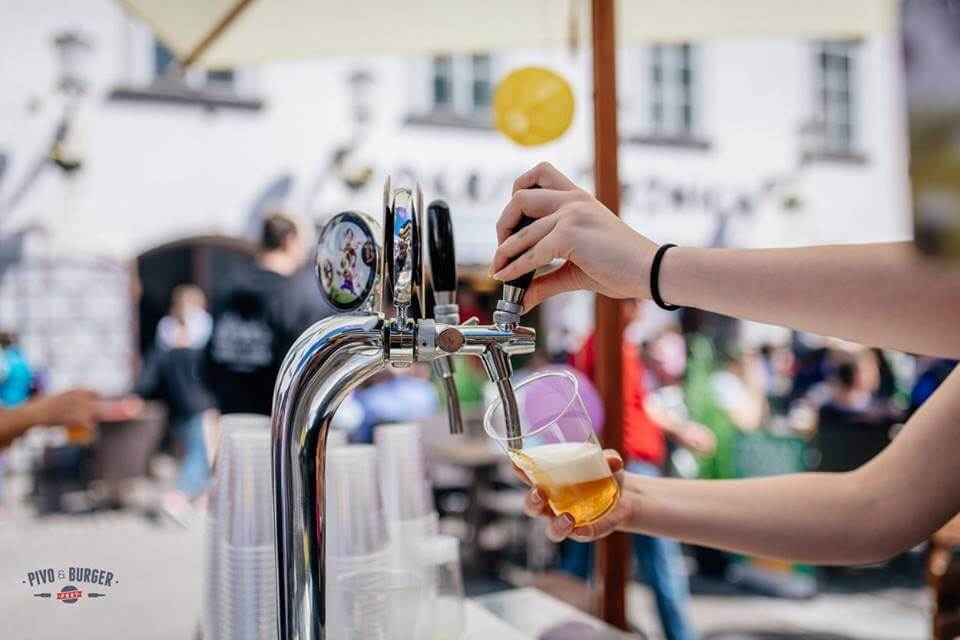

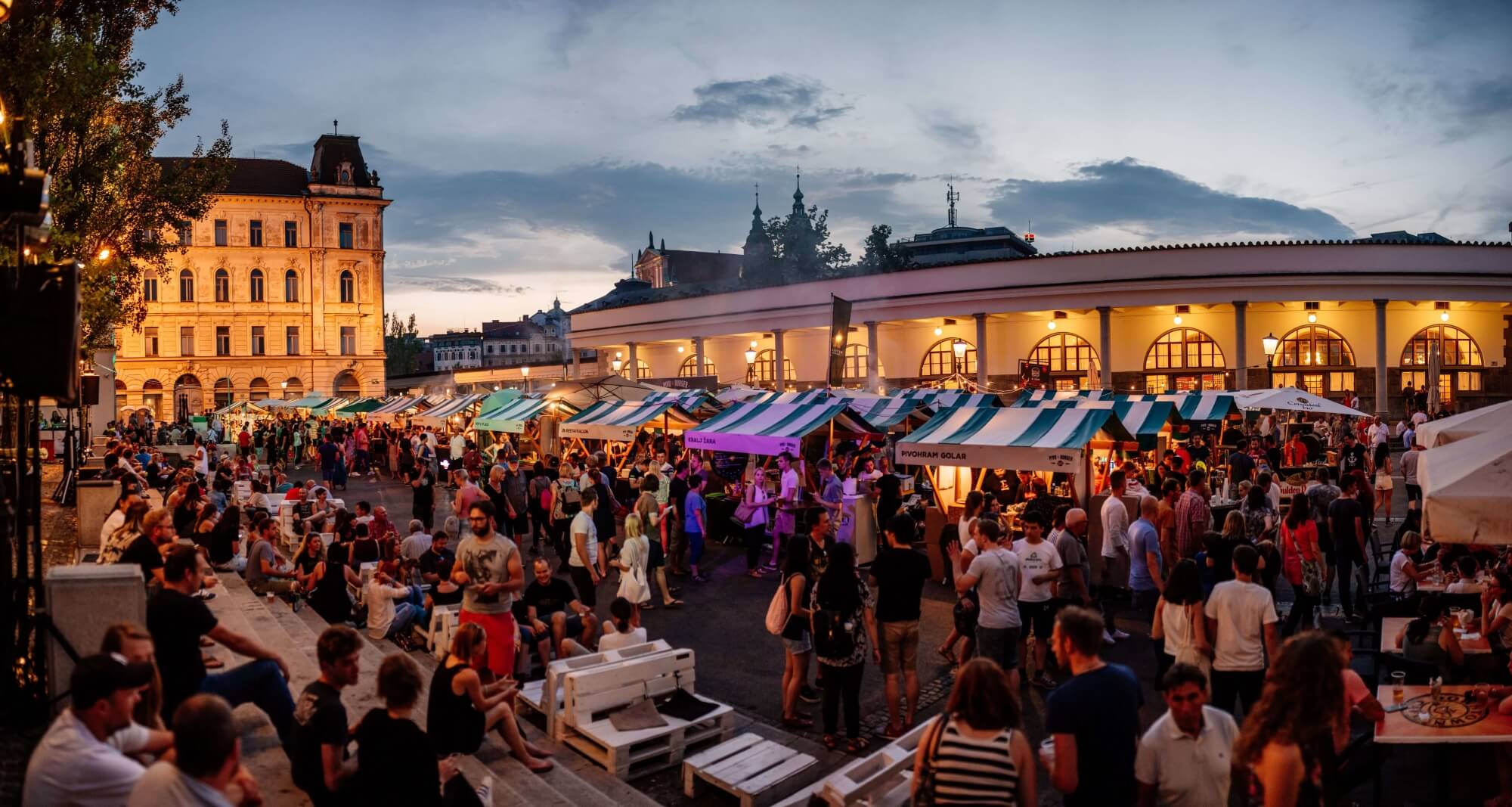
Indeed, the choice can be a little overwhelming, so it’s a good idea to walk around, see what’s on offer, and eat something to ensure you don’t get lost after the first few glasses. With regard to eating you’ll be able to choose from dozens of burgers, grilled in the square by big names and small, all tending to the gourmet variety, including vegetarian options, as well as pulled pork and other BBQ’d delights, in addition to some other food choices. What's more, the team at Open Kitchen have put together a series of food and beer pairings, which will be included in the catalogues you can pick up on the day, with the characteristics of different beers aligned with the foods on offer, whether savory or sweet, hot or cold.
The event runs over two days, the weekend of April 6 and 7, starting at 11:00 and ending 23:00, making it possible to enjoy burgers and beer for brunch, lunch, dinner and supper, with perhaps a few light snacks in between. It might not be the social event of the season, but for those of us for whom a burger and beer is the Platonic ideal of a weekend meal it’s a gathering not to be missed.
STA, 1 April 2019 - Aksinja Kermauner has resigned as the president of the Slovenian Writers' Association (Društvo slovenskih pisateljev, DSP). While Kermauner is expected to present her reasons on Tuesday, her resignation coincides with that of four DSP assistants. The first reactions indicate serious organisational and financial issues at the association.
Kermauner, a youth fiction author, poet and pedagogue, was appointed as DSP president only last September, succeeding Ivo Svetina, who had resigned in June over personal reasons.
The exact reason for her decision, which became public on Sunday, remains unclear, the newspaper Delo reported however today of a clash between DSP associates Nika Brajnik, Nina Kokelj, Agata Šimenc and Nana Vogrin and some of the DSP members and the management board.
The four, which had helped organise some of the DSP's major projects, resigned after failing to receive new temporary contracts and in the face of accusations about their handling of finances. They also spoke of being subject to bullying.
DSP vice-president and management board member Gabriela Babnik commented by saying the association was struggling with financial problems, "as are hundreds of associations around Slovenia".
"We were executing projects the same way we did five or ten years ago but the funding has been decreasing constantly," Babnik said, adding "the ladies refused to understand that". She does not believe any bullying took place.
Former DSP president Vlado Žabot also believes the tensions were mostly the result of the association being understaffed and underfunded while taking on ever new tasks.
PEN Slovenia head Ifigenija Simonovič commented by saying that much of what is being done by the DSP was based on voluntary work. Some projects which require enormous contributions are managed by poorly paid individuals who Simonovič said "are in fact the DSP's engine".
"A handful are working, while a 100 are sitting in their chair, watching and criticising. If we criticise those who are truly working, it is normal that things burst at one point," Simonovič said, suggesting the state needed to get involved to secure adequate funding.
STA, 1 April 2019 - President Borut Pahor, the supreme commander of the Slovenian Armed Forces, and Defence Minister Karl Erjavec have endorsed Maj Gen Alenka Ermenc, the chief of the general staff, after there have been speculations in the media over her possible replacement.
Pahor said on Monday he "could not imagine a third replacement at the head of the army in a year," referring to Ermenc replacing last November Alan Geder, who was at the post only nine months after replacing Andrej Osterman in February 2018.
The president stressed he did not see any valid reasons for Ermenc to be dismissed or resign.
Erjavec also expressed his support for the chief of the general staff, saying that he had not considered replacing her. He believes the military needs to be on the same page and dedicated to improving its state.
Slovenia's first female chief of the general staff and currently the only woman serving in such a position in NATO was reported to be losing the coalition's support due to a rumoured dispute between her and Erjavec, the government's general dissatisfaction with her work, and possible health reasons.
The Defence Ministry dismissed the health-related rumours, releasing a statement on Monday, which said that Ermenc was fit for duty and was able to carry out her tasks without any restrictions.
Ermenc returned to work on 22 March after taking a sick leave and will report on the state of the Slovenian Armed Forces to the president on Friday along with Erjavec.
Pahor pointed out that Slovenia had increased the military budget and called for joint support of Ermenc and her efforts to regenerate and modernise the military, thus fulfilling the 2020 goal of the army's positive assessment, set up by Erjavec in November last year.
All our stories about the military are here
Bookmark this link and find the headlines faster each morning
Debate: NATO remains key to security and stability
TRZIN - NATO remains vital to providing stability and security, a debate marking its 70th anniversary and Slovenia's 15-year membership of it heard. NATO is a unique partnership which has despite various threats successfully provided for stability and security for 70 years, Katja Geršak, the executive director of the Centre for European Perspective, which organised the debate, said. Similarly, Jelena Juvan from the Ljubljana Faculty of Social Sciences believes NATO will continue to pay an important role in European security and globally, noting the key to success was cooperation, both within NATO as well as with Russia and China. Defence Ministry State Secretary Klemen Grošelj added Slovenia was committed to its NATO goals, noting a white paper would provide a realistic plan about their implementation.
Pahor, Erjavec endorse army chief after media reports of dismissal
LJUBLJANA - President Borut Pahor, the supreme commander of the Slovenian Armed Forces, and Defence Minister Karl Erjavec endorsed Maj Gen Alenka Ermenc, the chief of the general staff, after the media speculated over her possible replacement. Pahor said he "could not imagine a third replacement at the head of the army in a year", stressing he did not see any valid reasons for Ermenc to be dismissed or to resign. Erjavec also expressed his support, saying he had not considered replacing her. Media reports had suggested Ermenc was losing the coalition's support due to a rumoured dispute with Erjavec, the government's dissatisfaction and possible health reasons.
Over 20 GPs in Kranj tender their resignation
KRANJ - GPs around Slovenia are stepping up pressure in the face of the increasing workload and red tape, with 23 doctors of the Kranj community health centre tendering their resignations. The move comes after the doctors threatened to quit their job as of 1 April unless the conditions are created enabling them to carry out their work safely and in line with medical standards. Doctors have a 60-day notice period, and if the situation is not resolved, the GPs will have to be let go at the end of May. GPs from the Ptuj Community Health Centre also joined the calls for change in primary healthcare, or else 16 GPs would resign on 1 June.
Maribor mayor's home also vandalised
MARIBOR - Following Thursday's attacks on two restaurants owned by Maribor Mayor Saša Arsenovič, his home was also attacked on Saturday. The reasons for the attacks by unknown perpetrators are still unknown, but are believed to be linked to his work as mayor. "The situation is becoming very serious," Arsenovič told the press, hoping the police would conclude the investigation of the incidents as soon as possible. The vandalism directed against Arsenovič's property was condemned by Maribor local politics last week, and today by the public administration and economy ministers.
Writers' Association head Kermauner resigns as systemic issues escalate
LJUBLJANA - Aksinja Kermauner resigned as of 1 April as the president of the Slovenian Writers' Association (DSP), with her resignation coinciding with that of four DSP assistants. While Kermauner is expected to present her reasons on Tuesday, the first reactions indicate serious organisational and financial issues at the DSP. Kermauner, a youth fiction author, poet and pedagogue, was elected president only last September, succeeding Ivo Svetina, who also resigned. The exact reason for her decision, which became public on Sunday, remains unclear, but the newspaper Delo reported of a clash between DSP associates and some of the DSP members and the management board.
NSi presents ex-Defence Minister Demšar as final EU vote candidate
LJUBLJANA - The opposition New Slovenia (NSi) presented Franci Demšar, a researcher and a former defence minister, as its final candidate for May's EU election. Demšar, to be listed seventh on the slate, served as defence minister between 1999 and 2000. He was also a researcher at the Jožef Stefan Institute, the director of the Slovenian Research Agency and Slovenia's ambassador to Russia. The NSi slate will be topped by its former leader and former MEP Ljudmila Novak, followed by deputy group leader Jožef Horvat, while Lojze Peterle, the party's only MEP, was placed on spot no. 3. The list also features Iva Dimic, Mojca Erjavec, Katja Berk Bevc, as well as former Democrats (SDS) Education Minister Žiga Turk, who was placed eighth.
SSH's net profit up last year
LJUBLJANA - Slovenian Sovereign Holding (SSH) recorded a net profit of EUR 41.8m last year, according to unaudited and unconsolidated data, which is 30.8% more than in 2017. Operating revenue almost doubled to EUR 13.5m, SSH said. The custodian of Slovenian state assets recorded an operating profit of EUR 1.3m last year after posting a loss of EUR 14m in 2017. Its long-term provisions totalled EUR 14.4m in 2017, while last year there were none. Financial revenue reached EUR 46.2m, down from EUR 55.8m in 2017.
Farm ministry gets new directorate for food and fisheries
LJUBLJANA - The Ministry of Agriculture, Forestry and Food launched a new directorate for food and fisheries to promote Slovenian food and enhance the vertical integration of the food supply chain. Minister Aleksandra Pivec told the STA the new directorate was needed because safe and quality food was an increasingly important issue for consumers. The directorate is divided into sectors for food; promotion of agricultural products and food; fisheries; and for legal matters.
STA, 1 April 2019 - GPs around the country are stepping up pressure in the face of the increasing workload and red tape. As announced, 23 doctors of the Kranj community health centre tendered their resignations on Monday, according to the head of the primary healthcare of Gorenjska, Jože Veternik.
The resignations come after the doctors threatened to quit their job as of 1 April unless the conditions are created enabling them to carry out their work safely and in line with medical standards.
Under the law, doctors have a 60-day notice period. If the situation is not resolved within the next 60 days, the GPs will have to be let go at the end of May, which means Kranj's primary healthcare would collapse, Veternik said.
According to the head of the Kranj Community Health Centre, Lilijana Gantar Žura, 23 of the 34 doctors tendered their resignation, which means 40,000 people would be left without their GP at the end of May.
"This is a serious alarm to which all stakeholders need to respond quickly," Gantar Žura said, calling for talks between the Health Ministry, government and the healthcare purse manager ZZZS.
"Doctors no longer believe promises and will withdraw their resignations only if things are agreed on, written down and signed," she said.
Veternik said they were counting on solving the situation this month. "The [health] minister paid a visit on Friday and we exchanged views. Our suggestion was for the minister to try to meet at least part of the doctors' demands in April," he said.
Health Minister Aleš Šabeder met the head of the Praktikum trade union of GPs, Igor Muževič, in Ljubljana today. No concrete measures were agreed, but both labelled the meeting constructive. A task force will meet again on Wednesday.
The meeting also seemed to have cleared out Friday's misunderstanding when doctors refused to meet the minister after being denied having their representatives present at the meetings between the minister and the leaderships of the community health centres.
"The minister has indeed been open for talks with trade unions all along, which we could see today," Muževič said after meeting Šabader.
The minister said he was aware solutions would need to be found quickly. "We have a month, two at the most to settle the matter and reach an agreement," he said.
Among the solutions discussed today is importing doctors from abroad, which Šabeder warned would take time because of the necessary legislative changes. "Quick calculations show that we would need approximately 50 doctors in the short-term at this point," the minister said.
The trade union also proposed an emergency bill to prevent patients who cannot be admitted by a GP in their community health centre to be sent off to another centre. In turn, the understaffed centre would be given an option to hire a doctor from abroad, a retired doctor or a freelancer to ensure primary care to all patients.
Vetrnik thinks it is crucial to change the ceiling for accepting new patients. Last year the ceiling was at 1,995 patients per GP, while this year's ceiling is the average of a particular community health centre.
Currently, the average patient index for Slovenia is some 2,400 or 1,850 patients per a team of doctors, but in Kranj a team of doctors deals with some 2,000 patents, which is 10% more than an average Slovenian doctor and 25% above the 2017 agreement.
"This must have been the last straw that caused the doctors' resignations in Kranj, and the announcements of resignation in Celje and Maribor," Veternik said.
Doctors want the ministry and the ZZZS to endorse the standards and norms from the 2017 strike-averting agreement.
Later in the day, GPs from the Ptuj Community Health Centre joined the calls for change in primary healthcare, or else 16 GPs would collectively resign on 1 June, the Ptuj health centre said in a release.
The Ptuj GPs demand that once a doctor has 1,895 patients, they no longer accept new patients, and the figure should be gradually cut, by 5% annually, to eventually drop to 1,500.
The doctors in Kranj were the first to protest against the plan to increase the patient index, and stopped accepting new patients already in February. They also addressed a letter to Samo Fakin, who in the meantime resigned as health minister due to ill health, in which they threatened to quit by the end of March.
All of the 15 GPs at the Celje Community Health Centre issued a similar threat last month, while three doctors at the Nazarje Community Health Centre have already resigned.
GPs in Ajdovščina announced they would do no more overtime and GPs in Grosuplje announced they would stop accepting new patients. The GPs of the Maribor Community Health Centre threatened to quit their job on 1 June unless the situation is resolved.
All our stories about healthcare in Slovenia are here


